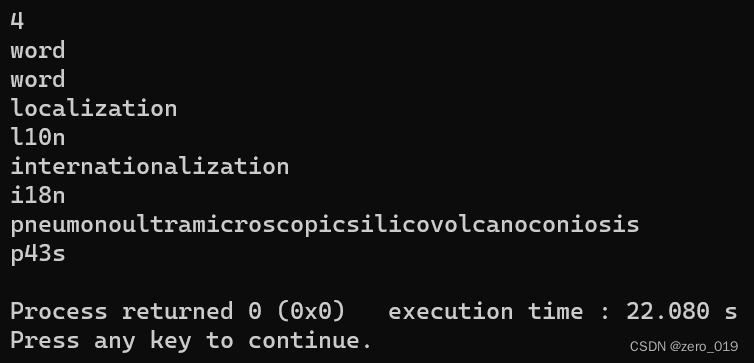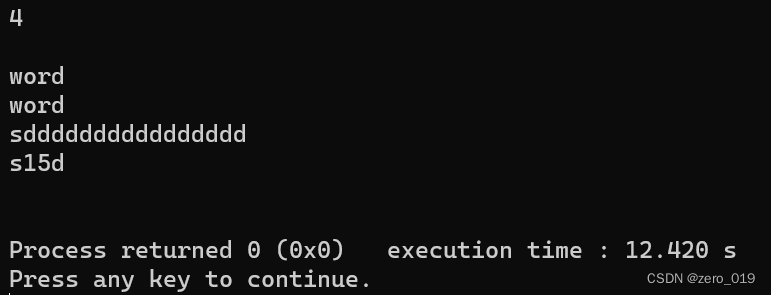codeforces 刷题d1
A. Way Too Long Words
time limit per test:1 second
memory limit per test:256 megabytes
input:standard input
output:standard output
Sometimes some words like "localization" or "internationalization" are so long that writing them many times in one text is quite tiresome.
Let's consider a word?too long, if its length is?strictly more?than?10?characters. All too long words should be replaced with a special abbreviation.
This abbreviation is made like this: we write down the first and the last letter of a word and between them we write the number of letters between the first and the last letters. That number is in decimal system and doesn't contain any leading zeroes.
Thus, "localization" will be spelt as "l10n", and "internationalization? will be spelt as "i18n".
You are suggested to automatize the process of changing the words with abbreviations. At that all too long words should be replaced by the abbreviation and the words that are not too long should not undergo any changes.
Input
The first line contains an integer?n?(1?≤?n?≤?100). Each of the following?n?lines contains one word. All the words consist of lowercase Latin letters and possess the lengths of from?1?to?100?characters.
Output
Print?n?lines. The?i-th line should contain the result of replacing of the?i-th word from the input data.
Examples
input
4 word localization internationalization pneumonoultramicroscopicsilicovolcanoconiosis
output
word l10n i18n p43s
题解
#include <stdio.h>
#include <stdlib.h>
#include <string.h>
#include <math.h>
int main()
{
char a[101];
int n;
scanf("%d",&n);
int i;
getchar();
for(i=0;i<n;i++)
{
gets(a);
if(strlen(a)>10)
{
printf("%c%d%c\n",a[0],strlen(a)-2,a[strlen(a)-1]);
}
else
puts(a);
}
return 0;
}
输入输出

错误示范
#include <stdio.h>
#include <stdlib.h>
#include <string.h>
#include <math.h>
int main()
{
char a[81];//题目限制了字符长度是一到一百,应该改为a[101]
//char a[80];在早期的C语言中,80 字符宽度被广泛用于标准文本终端的宽度。
//这样的选择可以确保在一行上能够容纳足够的字符,以便在终端上显示文本。
//但不适用于本道题
int n;
scanf("%d",&n);
//在使用 scanf("%d", &n); 读取整数后
//缓冲区中还留有一个回车符('\n'),而 gets(a); 会读取这个回车符
//导致输入提前结束。
//可以改用 getchar(); 来吸收这个回车符
int i;
for(i=0;i<n;i++)
{
gets(a);
if(strlen(a)>10)
{
printf("%c%d%c",a[0],strlen(a)-2,a[strlen(a)-1]);//这里忘记加\n
}
else
puts(a);
}
return 0;
}错误的输入输出


总结:
1.注意细节。要用多少内存空间,printf()里面一定要加\n
2.遇到scanf和gets()同时存在时,要根据情况看是否要添加getchar()回收换行符
本文来自互联网用户投稿,该文观点仅代表作者本人,不代表本站立场。本站仅提供信息存储空间服务,不拥有所有权,不承担相关法律责任。 如若内容造成侵权/违法违规/事实不符,请联系我的编程经验分享网邮箱:chenni525@qq.com进行投诉反馈,一经查实,立即删除!